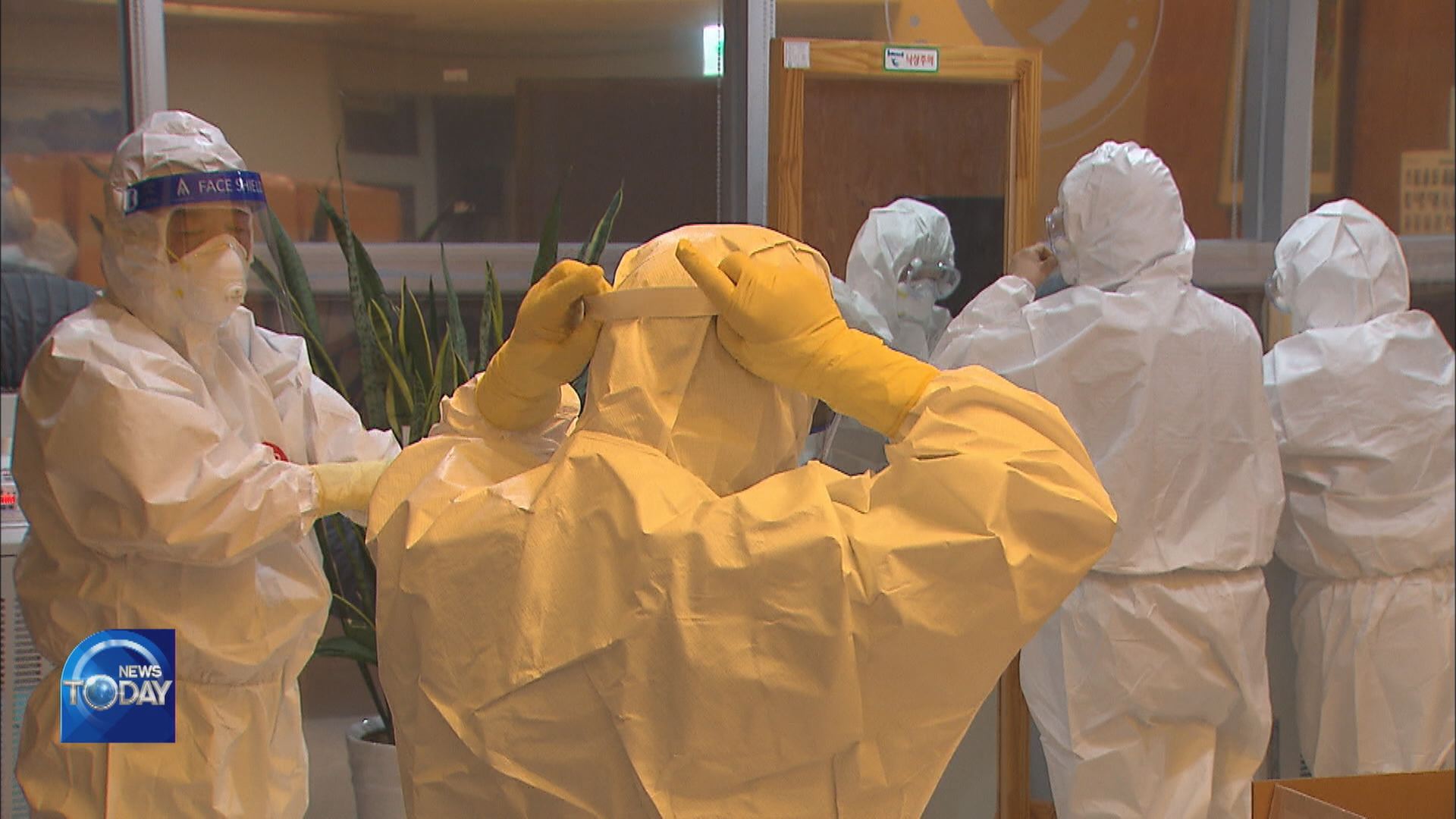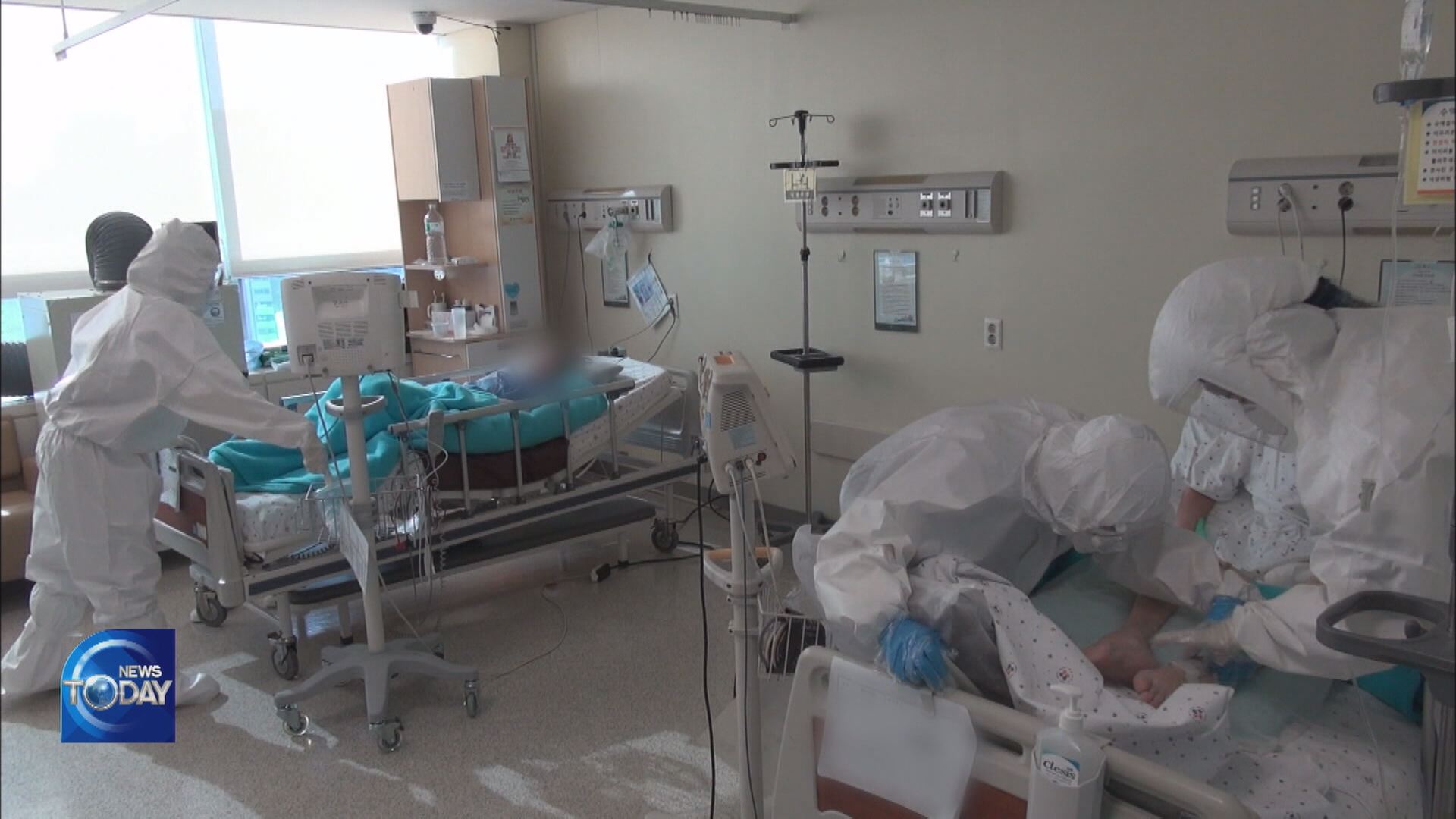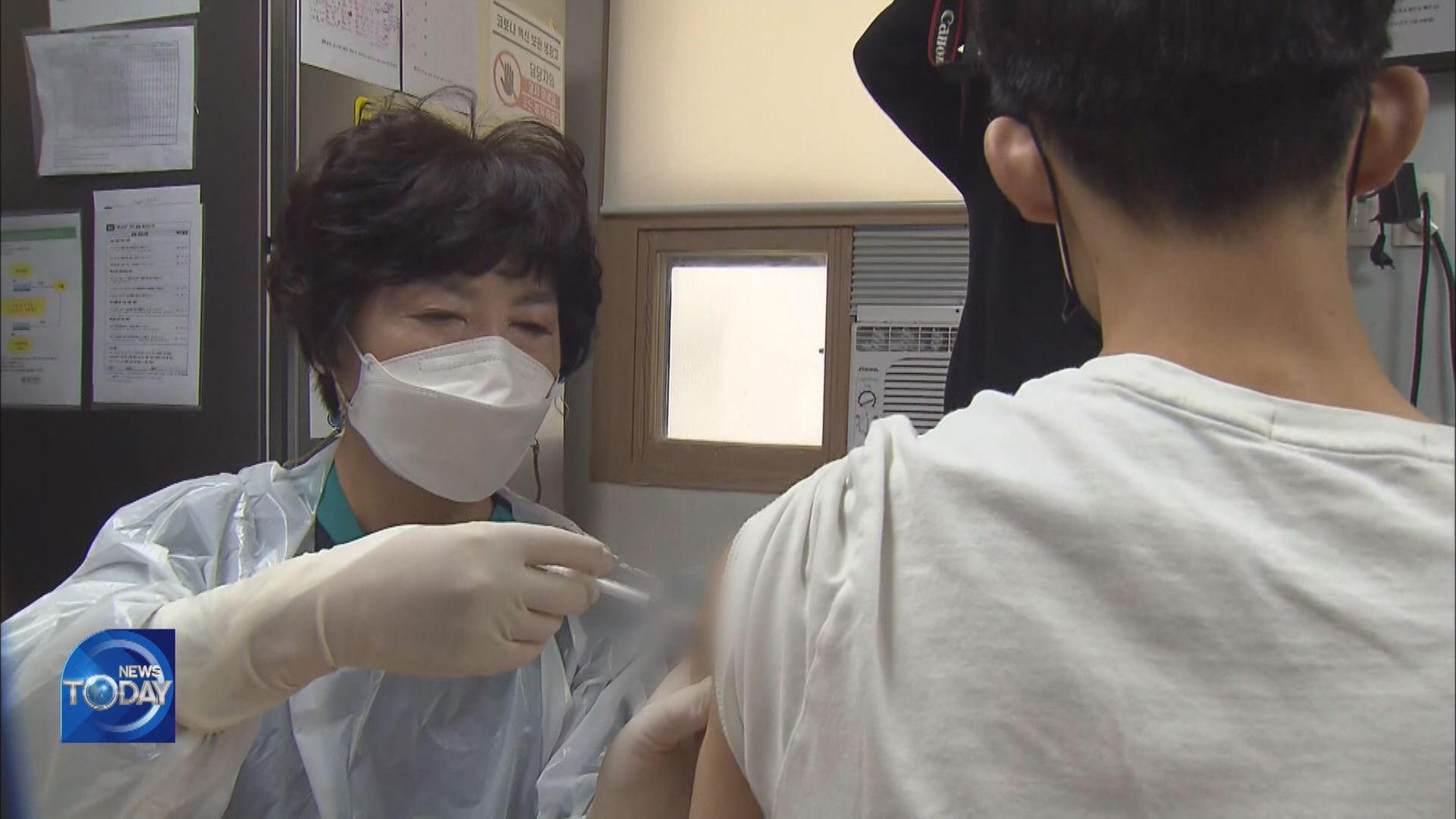MEDICAL SYSTEM STRETCHED TO LIMIT
입력 2021.12.07 (15:45)
수정 2021.12.07 (16:46)
읽어주기 기능은 크롬기반의
브라우저에서만 사용하실 수 있습니다.
[Anchor Lead]
As new COVID-19 infections and critical cases continue to hit new highs, hospitals are being stretched to the limit. Hospital beds are running short while severe cases are increasing among seniors. The healthcare system and medical staff are under enormous strain reaching a breaking point.
[Pkg]
A convalescent hospital in Seoul is exclusively serving infectious disease patients. Eight out of ten beds are constantly occupied. Around 60 patients check into or out of the hospital on a daily basis. Doctors and nurses say the situation is nothing short of a war.
[Soundbite] Baek Yeon-hee(Nurse) : "Many of our patients are elderly. We're worried. Their fever won't go down."
[Soundbite] Yang Myeong-ja(Nurse) : "Sometimes I really want to run away. Drained by work, there's little we can do."
With a rising percentage of severely ill patients, the pressure has further escalated. Patient conditions continue to worsen but with not enough beds, they often need to wait for days to receive proper care.
[Soundbite] Baek Yeon-hee(Nurse) : "Failing to go to another hospital, some have died here while getting treated."
[Soundbite] Yoon Yeong-bok(President, Misodle Hospital) : "When discharge of critical patients was smooth, we could also focus on semi-serious cases. Now, all our energy is devoted to the most critical group which is draining."
The situation is similar at another infectious disease hospitals where elderly patients have noticeably increased.
[Soundbite] Choi Jae-pil(Infectious disease director, Seoul Medical Center) : "Seniors in their 70s and above account for about 80% and the number keeps rising."
Caretakers and family members have been banned access due to infection risks, putting even more burden on medical workers.
[Soundbite] Kim Gyeong-jin(Nurse) : "Many can't move on their own, so we need to help them move and change their diapers etc. Many little things require our assistance."
Amid a spike in severe cases, assigning a bed to accommodate each patient's condition is also a challenge.
[Soundbite] Jang Jeong-hyeon(Nurse) : "Many patients were already in poor health when they first arrived. As hospitals fill up, they have few options to go elsewhere."
Hospitals also need to oversee at-home patients, further increasing their already unmanageable workload.
[Soundbite] Kang Sun-won(Seoul Medical Center) : "There isn't a moment to spare or rest. It feels like we're at the front lines of war."
As new COVID-19 infections and critical cases continue to hit new highs, hospitals are being stretched to the limit. Hospital beds are running short while severe cases are increasing among seniors. The healthcare system and medical staff are under enormous strain reaching a breaking point.
[Pkg]
A convalescent hospital in Seoul is exclusively serving infectious disease patients. Eight out of ten beds are constantly occupied. Around 60 patients check into or out of the hospital on a daily basis. Doctors and nurses say the situation is nothing short of a war.
[Soundbite] Baek Yeon-hee(Nurse) : "Many of our patients are elderly. We're worried. Their fever won't go down."
[Soundbite] Yang Myeong-ja(Nurse) : "Sometimes I really want to run away. Drained by work, there's little we can do."
With a rising percentage of severely ill patients, the pressure has further escalated. Patient conditions continue to worsen but with not enough beds, they often need to wait for days to receive proper care.
[Soundbite] Baek Yeon-hee(Nurse) : "Failing to go to another hospital, some have died here while getting treated."
[Soundbite] Yoon Yeong-bok(President, Misodle Hospital) : "When discharge of critical patients was smooth, we could also focus on semi-serious cases. Now, all our energy is devoted to the most critical group which is draining."
The situation is similar at another infectious disease hospitals where elderly patients have noticeably increased.
[Soundbite] Choi Jae-pil(Infectious disease director, Seoul Medical Center) : "Seniors in their 70s and above account for about 80% and the number keeps rising."
Caretakers and family members have been banned access due to infection risks, putting even more burden on medical workers.
[Soundbite] Kim Gyeong-jin(Nurse) : "Many can't move on their own, so we need to help them move and change their diapers etc. Many little things require our assistance."
Amid a spike in severe cases, assigning a bed to accommodate each patient's condition is also a challenge.
[Soundbite] Jang Jeong-hyeon(Nurse) : "Many patients were already in poor health when they first arrived. As hospitals fill up, they have few options to go elsewhere."
Hospitals also need to oversee at-home patients, further increasing their already unmanageable workload.
[Soundbite] Kang Sun-won(Seoul Medical Center) : "There isn't a moment to spare or rest. It feels like we're at the front lines of war."
■ 제보하기
▷ 카카오톡 : 'KBS제보' 검색, 채널 추가
▷ 전화 : 02-781-1234, 4444
▷ 이메일 : kbs1234@kbs.co.kr
▷ 유튜브, 네이버, 카카오에서도 KBS뉴스를 구독해주세요!
- MEDICAL SYSTEM STRETCHED TO LIMIT
-
- 입력 2021-12-07 15:45:00
- 수정2021-12-07 16:46:31

[Anchor Lead]
As new COVID-19 infections and critical cases continue to hit new highs, hospitals are being stretched to the limit. Hospital beds are running short while severe cases are increasing among seniors. The healthcare system and medical staff are under enormous strain reaching a breaking point.
[Pkg]
A convalescent hospital in Seoul is exclusively serving infectious disease patients. Eight out of ten beds are constantly occupied. Around 60 patients check into or out of the hospital on a daily basis. Doctors and nurses say the situation is nothing short of a war.
[Soundbite] Baek Yeon-hee(Nurse) : "Many of our patients are elderly. We're worried. Their fever won't go down."
[Soundbite] Yang Myeong-ja(Nurse) : "Sometimes I really want to run away. Drained by work, there's little we can do."
With a rising percentage of severely ill patients, the pressure has further escalated. Patient conditions continue to worsen but with not enough beds, they often need to wait for days to receive proper care.
[Soundbite] Baek Yeon-hee(Nurse) : "Failing to go to another hospital, some have died here while getting treated."
[Soundbite] Yoon Yeong-bok(President, Misodle Hospital) : "When discharge of critical patients was smooth, we could also focus on semi-serious cases. Now, all our energy is devoted to the most critical group which is draining."
The situation is similar at another infectious disease hospitals where elderly patients have noticeably increased.
[Soundbite] Choi Jae-pil(Infectious disease director, Seoul Medical Center) : "Seniors in their 70s and above account for about 80% and the number keeps rising."
Caretakers and family members have been banned access due to infection risks, putting even more burden on medical workers.
[Soundbite] Kim Gyeong-jin(Nurse) : "Many can't move on their own, so we need to help them move and change their diapers etc. Many little things require our assistance."
Amid a spike in severe cases, assigning a bed to accommodate each patient's condition is also a challenge.
[Soundbite] Jang Jeong-hyeon(Nurse) : "Many patients were already in poor health when they first arrived. As hospitals fill up, they have few options to go elsewhere."
Hospitals also need to oversee at-home patients, further increasing their already unmanageable workload.
[Soundbite] Kang Sun-won(Seoul Medical Center) : "There isn't a moment to spare or rest. It feels like we're at the front lines of war."
As new COVID-19 infections and critical cases continue to hit new highs, hospitals are being stretched to the limit. Hospital beds are running short while severe cases are increasing among seniors. The healthcare system and medical staff are under enormous strain reaching a breaking point.
[Pkg]
A convalescent hospital in Seoul is exclusively serving infectious disease patients. Eight out of ten beds are constantly occupied. Around 60 patients check into or out of the hospital on a daily basis. Doctors and nurses say the situation is nothing short of a war.
[Soundbite] Baek Yeon-hee(Nurse) : "Many of our patients are elderly. We're worried. Their fever won't go down."
[Soundbite] Yang Myeong-ja(Nurse) : "Sometimes I really want to run away. Drained by work, there's little we can do."
With a rising percentage of severely ill patients, the pressure has further escalated. Patient conditions continue to worsen but with not enough beds, they often need to wait for days to receive proper care.
[Soundbite] Baek Yeon-hee(Nurse) : "Failing to go to another hospital, some have died here while getting treated."
[Soundbite] Yoon Yeong-bok(President, Misodle Hospital) : "When discharge of critical patients was smooth, we could also focus on semi-serious cases. Now, all our energy is devoted to the most critical group which is draining."
The situation is similar at another infectious disease hospitals where elderly patients have noticeably increased.
[Soundbite] Choi Jae-pil(Infectious disease director, Seoul Medical Center) : "Seniors in their 70s and above account for about 80% and the number keeps rising."
Caretakers and family members have been banned access due to infection risks, putting even more burden on medical workers.
[Soundbite] Kim Gyeong-jin(Nurse) : "Many can't move on their own, so we need to help them move and change their diapers etc. Many little things require our assistance."
Amid a spike in severe cases, assigning a bed to accommodate each patient's condition is also a challenge.
[Soundbite] Jang Jeong-hyeon(Nurse) : "Many patients were already in poor health when they first arrived. As hospitals fill up, they have few options to go elsewhere."
Hospitals also need to oversee at-home patients, further increasing their already unmanageable workload.
[Soundbite] Kang Sun-won(Seoul Medical Center) : "There isn't a moment to spare or rest. It feels like we're at the front lines of war."
이 기사가 좋으셨다면
-
좋아요
0
-
응원해요
0
-
후속 원해요
0












![[속보] 심우정 검찰총장 사의 표명…오후 3시 입장 <br>발표](/data/layer/904/2025/07/20250701_1Gcu1S.jpg)
![[속보] 내란 특검, 윤 전 대통령에게 “5일 오전 9시까지 출석” 통지](/data/layer/904/2025/07/20250701_6mdRFo.jpg)

![[영상] 정성호 “검찰 해체 표현 적절치 않아…수사·기소 분리 국민 공감대”](/data/fckeditor/vod/2025/07/01/305901751367182615.png)

이 기사에 대한 의견을 남겨주세요.